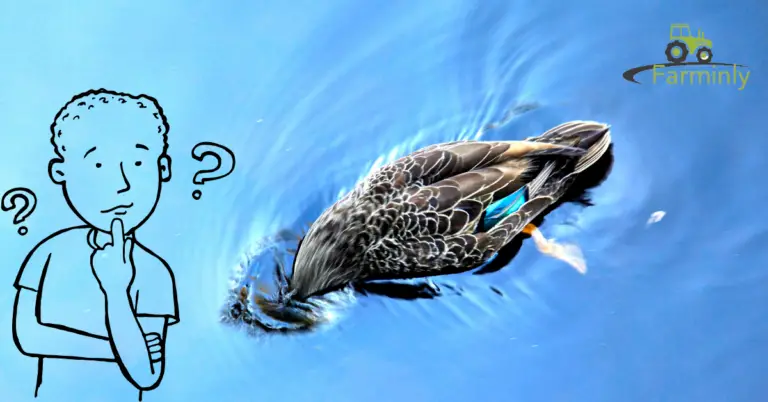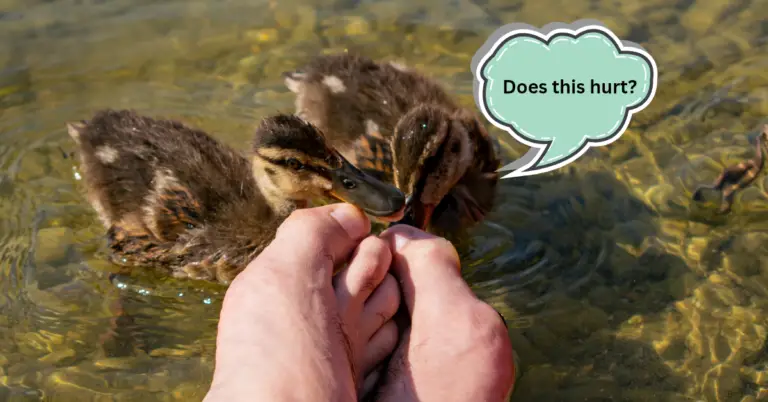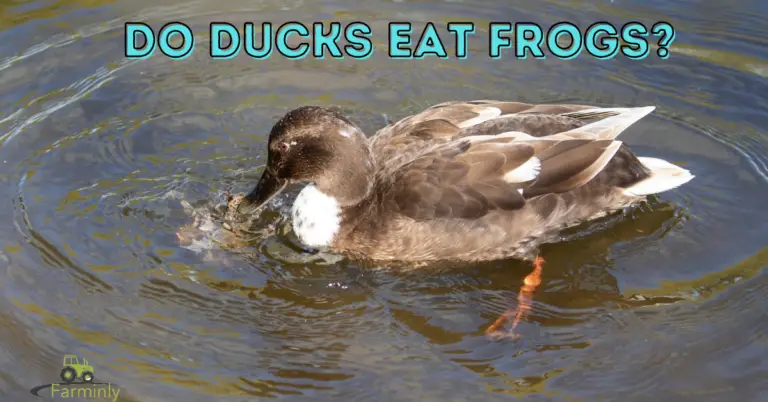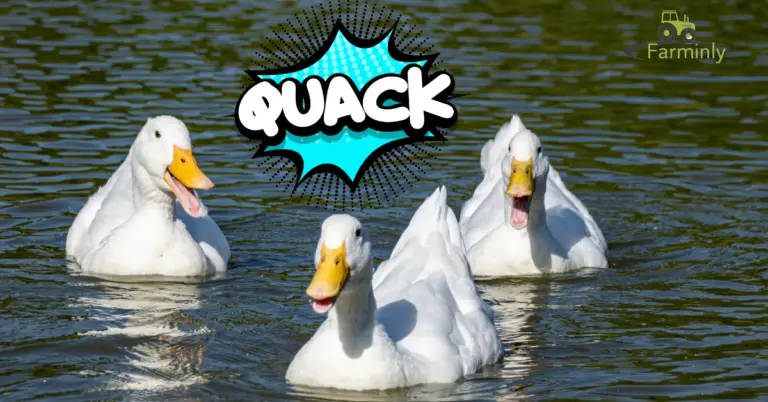We frequently regard ducks as adorable and entertaining creatures that waddle and quack. However, are they dumb & stupid?
Many individuals who have seen ducks in their natural habitat or owned them as pets have been baffled by this subject. Ducks are intriguing creatures with incredible cognitive abilities, even if they may not be as intelligent as other animals like primates or dolphins.
This article will examine the claim that ducks are smart and a few of the manners in which they exhibit intelligence.
Are Ducks Dumb Animals?
Ducks are intelligent birds with a degree of intelligence comparable to other animals. They have a unique way of expression that allows them to denote their emotions.
Furthermore, they are fantastic when expressing feelings, especially with their “birth” parents. A duck will remain with the parent it encounters after hatching and gets attached to that animal throughout its existence.

Furthermore, ducks are intelligent and can be taught to learn and follow commands. If trained, these animals respond to or react to their names.
They are intelligent in that they can distinguish between individuals and remember them. Ducks can even sense your availability, as you can see them scan the area before sneaking into the human pool to see if anyone is close. They leave the pool when they hear any noise from someone opening the door or approaching.
How Smart are Ducks?
Ducks have cognitive capacities, including recalling information, learning, and solving problems. Like many other animals, ducks have developed specific cognitive skills that help them flourish in their surroundings. Some of these abilities are:
Communication
Ducks are famous for their distinctive quacking sounds, but what do these sounds mean? Research has shown that ducks use various vocalizations to communicate with each other, including calls that signal danger, food, and mating opportunities.
Furthermore, they use body postures and visual displays to convey information, such as displaying their colorful plumage to attract mates.

Evolution of Intelligence
The evolution of intelligence in animals is a complex topic, with many factors influencing the development of cognitive abilities. In the case of ducks, there are thoughts that their aquatic lifestyle and the challenges of navigating complex waterways may have played a role in developing their problem-solving skills and spatial memory.
Furthermore, the social and communicative demands of their group living may have contributed to their social intelligence.
Learning
Ducks can learn various behaviors and skills, from finding food to avoiding predators. They can also learn from each other, with younger ducks observing and mimicking the behaviors of older ducks.
A study even showed that ducks could learn to associate specific colors with certain food rewards, demonstrating a capacity for complex learning.
Memory
Like many animals, ducks use memory to navigate their environments and find food. But how strong is their memory? Studies have shown that ducks can remember specific landmarks and locations and even remember individual humans and animals over long periods.
In one study, ducks could remember a specific human experimenter even after an absence of 17 months.

Problem-Solving Skills
Ducks are famous for their ability to navigate complex waterways and locate food in challenging environments. But are they capable of more advanced problem-solving skills?
Recent research suggests that ducks can solve challenging puzzles to obtain rewards, demonstrating impressive cognitive abilities. One study found that ducks can use tools to obtain food, and another showed that they could even learn to use mirrors to find hidden treats.
One area where ducks particularly stand out is their problem-solving abilities. Some of their problem-solving abilities include:
Use of Tools
One of the ducks’ most impressive problem-solving abilities is their use of tools. Studies show that ducks can use objects in their environment as tools to achieve a goal, such as using sticks to reach food that is out of reach. This ability demonstrates a method to understand cause and effect and use available resources to solve problems.
Innovation
Ducks are also capable of innovation when it comes to problem-solving. In experiments, researchers observed ducks as they created new behaviors to achieve a goal, such as using their bills to lift a lever instead of pushing it. This behavior demonstrates creativity and adaptability, which researchers often associate with higher cognitive abilities.
Social Behavior
Ducks are social creatures, often congregating in groups and engaging in various social behaviors. Research suggests that ducks are highly attuned to the emotions of other ducks and can distinguish between different vocalizations and body postures to understand their peers’ intentions.
They can also form strong bonds with their mates and offspring, exhibiting complex social behavior.
Are Ducks as Intelligent as Humans?
For a considerable time, ducks have intrigued scientists with their cognitive abilities, and they have performed various experiments to learn the extent of their intelligence. Some intelligence tests performed on ducks include;
Spatial Awareness Tests
One of the most ordinary intelligence tests for ducks involves assessing their spatial awareness. In these tests, they place ducks in a maze or obstacle course and observe their ability to navigate and remember the route.
Studies have shown that ducks can navigate complex mazes and use landmarks to remember the correct path.
Object Recognition Tests
Another intelligence test for ducks involves object recognition. They present them with various objects and observe their ability to identify and remember them. Researchers found that ducks can recognize objects and their associated characteristics for extended periods. Thus, demonstrating impressive memory retention.
Problem-Solving Tests
Researchers have also used problem-solving tests to assess duck intelligence. In these tests, they present ducks with a problem, such as accessing food that is out of reach, and they study their ability to find a solution.
Studies found that ducks are adept at problem-solving and can use various techniques to overcome obstacles and achieve their goals.
Social Intelligence Tests
Ducks are social creatures, and researchers have conducted many tests to assess their social intelligence. In these tests, they observed their interaction with other ducks, and their ability to communicate, cooperate, and exhibit empathy gets assessed.
Studies found that ducks are social animals and can communicate using various vocalizations and body language cues.
Learning and Memory Retention Tests
Researchers also conducted tests to assess ducks’ learning and memory retention abilities. In these tests, they train ducks to associate particular objects or sounds with rewards and then observe their ability to remember these associations.
These studies found that ducks can learn and remember associations for extended periods.
Factors That Influence Duck Intelligence
Researchers have identified several factors that can impact duck intelligence. This section explores factors that influence duck intelligence and what this means for our understanding of these remarkable birds.
1. Age
Age influences duck intelligence. Like humans, ducks may experience a decline in cognitive abilities as they age.
However, studies show that older ducks can continue to learn and keep the information and that cognitive abilities decline through regular mental stimulation and social interaction.
2. Diet
The diet of a duck can also impact its intelligence. Studies showed that a diet rich in omega-3 fatty acids found in fish improves cognitive abilities in ducks. However, a diet lacking these essential fatty acids can hurt duck intelligence.
3. Environment
The environment in which a duck grows up can significantly impact their cognitive abilities. Studies showed that ducks raised in enriched environments, with access to toys, puzzles, and social interaction, have higher cognitive abilities than those raised in less stimulating environments.
Like in humans, genetics can play a role in duck intelligence. Some ducks may be born with a predisposition towards higher intelligence, while others may be more limited in cognitive abilities.
However, while genetics may impact duck intelligence, environmental factors also play a significant role.
4. Stress
Stress can also play a role in duck intelligence. Ducks exposed to chronic stress, such as overcrowding or lack of access to food or water, may have reduced cognitive abilities.
Conclusion
Ducks are, in fact, intelligent animals with cognitive skills that enable them to adapt and flourish in their habitats. They exhibit intelligence in various methods, including exceptional spatial memory, problem-solving abilities, and the ability to acquire knowledge from other ducks.
Now that you know this, you can let them thrive as much as they want, even when housed as pets.
References
- Antone Martinho, I., & Kacelnik, A. (2016). Ducklings imprint on the relational concept of “same or different”. Science. https://doi.org/aaf4247
- Wasserman, E. A. (2016). Thinking abstractly like a duck(ling). Science. https://doi.org/aag3088






